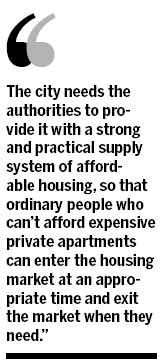Voices
Why are locals fleeing Beijing?
By Pan Yuling (China Daily)
Updated: 2010-04-28 08:02
 |
Large Medium Small |

An online post by a Beijinger, who is about to move his family out of the city because of the high house prices, has struck a chord with the public and aroused much sympathy.
Mr Yu wrote that he bought an apartment in 2005 in suburban Beijing after years of hard work. However, he became jobless during the financial crisis. He didn't want to rely on his parents. Instead, he sold his apartment for 400,000 yuan in 2009 without telling his parents and moved into a rented apartment. With the skyrocketing house prices in the suburbs, Yu couldn't even afford the down payment on another place.
His wife said to him: "If we can't make it, we can move to my hometown in Shandong province."
Many stories about leaving Beijng have been told. For instance, a friend from my hometown, who works for one of the "big four" accounting agencies in the CBD since graduating two years ago, is also preparing to leave the city, to which he feels he doesn't belong, because he can't stand living in an rented apartment with two other people and can't afford to buy his own place.
Things have moved to a whole new level when Beijingers, who were born and bred in the city, are compelled to become drifters and are even forced out of the city.
Looking back over the past ten years, the ever-rising house prices have triggered the latest Beijing migrations as the elite from across the country move to the capital, while native Beijingers who earn middle and low incomes have been relocated from the central urban areas, where they've lived for decades, to take up residence in suburb areas such as Changping, Daxing, Tongzhou and Fangshan.
The migration to Beijing is not a bad thing. But economic development, wealth accumulation and rising land and house prices are an inexorable law, and when house prices skyrocket beyond the reach of local residents - who must then consider whether to stay on - policymakers should take notice.
Although land for affordable houses accounts for more than half of the city's land supply plan, it will take one to two years before these houses are available on the market. Before that happens, it seems that all ordinary house purchasers can do is wait.
The problem is then whether such waiting is realistic? Do people have reason enough to believe that in the near future relevant government departments can guarantee that the majority of low- and middle-income earners will be able to live in a decent apartment, even rented properties?
The city needs the authorities to provide it with a strong and practical supply system of affordable housing, so that ordinary people who can't afford expensive private apartments can enter the housing market at an appropriate time and exit the market when they need.
Only with such system in place can both new migrants and native Beijingers have a sense of security and live and work in the city with confidence. For Beijing to become a real metropolis, this sense of security is surely essential. But before the creation of the system, how many more people will feel that they have no other option but to leave Beijing?
Excerpts of a commentary that first appeared on the Beijing News on April 16.







